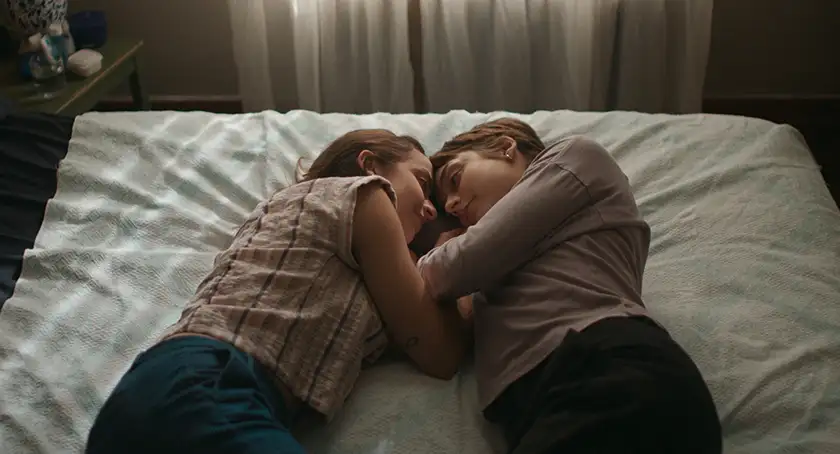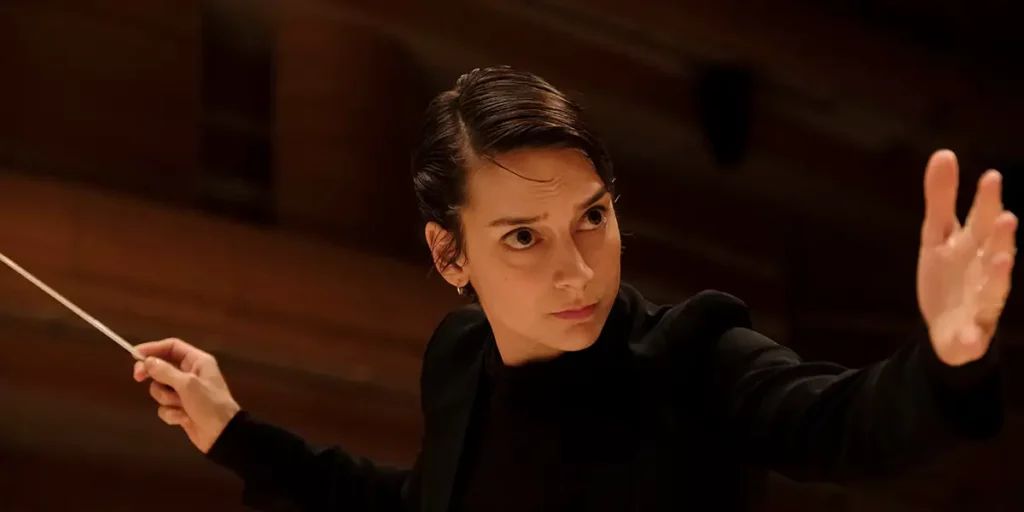Chloé Robichaud’s Days of Happiness is a well-shot, sympathetic drama about a composer trying to find balance in her personal life.
In Days of Happiness, Emma (Sophie Desmarais) is a promising young conductor from Montreal about to finish a year-long residency in her hometown. On the podium, she knows what she wants from her orchestra and what sounds she needs to produce. Away from it though, Emma is having to juggle professional and personal problems. Her relationship with her father/agent, Patrick (Sylvain Marcel), is complex and full of friction. He is helping to find her a permanent position but can be controlling and forthright, so concentrated on her work and career that he doesn’t act like her father. Patrick is also incredibly persuasive. On his advice, she chooses Schoenberg for her ‘carte blanche’ piece, an audacious choice that might be too big a challenge.
Meanwhile, Emma has been dating cellist Naëlle (Nour Belkhiria) for eight months. However, Naëlle is still in therapy with Jad’s father (the husband she has recently separated from). She also hasn’t introduced Emma to her son Jad (Rayan Benmoussa). As Emma faces more and more scrutiny, she begins to re-evaluate all her relationships.
A great example of the often-unpublicised sector of Quebec cinema, Days of Happiness is the new film by writer-director Chloé Robichaud. Her press notes describe her desire to film this story with a sense of openness and immersion, and Robichaud closely presents the inner strife and eventual freedom of a gifted but bottled-up wunderkind who must balance so much. Right from the start, when Emma is floating away on an inflatable raft – unable to swim back to shore – she is emotionally adrift. That feeling could find its way into her conducting, with mentor Sivigny (Vincent Leclerc) wondering if she is so fixated on being perfect that she cannot feel the music.
Comparisons to Todd Field’s TÁR are inevitable. Both that film and Days of Happiness are about lesbian composers who are in relationships with members of their orchestra, navigating power dynamics and other pressures as they work towards a Mahler performance. However, there is a clear difference in the protagonists. Lydia Tár is a brilliant genius who holds court with the Berlin Philharmoniker but is belittling and (as is the crux to her downfall) prone to predatory behaviour. Conversely, Sophie Desmarais – previously the star of Robichaud’s Sarah Prefers to Run – portrays Emma as an unformed conductor, a reserved figure with subtle looks of apprehension.

Desmarais is part of a range of interesting, noteworthy performances. Nour Belkhiria’s Naëlle worries about the reaction of her family to her sexuality, taking things slow with Emma. That leads to Emma forming a close bond with Jad, a facet of the film that parallels Rebecca Zlotowski’s similarly empathetic drama Other People’s Children. Meanwhile, Sylvian Marcel’s Patrick is stoic and inconsiderate. He believes his daughter is talented but is simultaneously capable of great anger towards her. Like Emma, there are parts of him that he hasn’t opened up. When his mother (Emma’s grandmother) passes away, she finds out her grandfather died months previously and that the news was kept from her by Patrick. Part of his reasoning (as revealed later on) demonstrates the toxicity Emma has to face from her family’s past.
The film is well-shot thanks to DP Ariel Méthot, whose camera sometimes follows Emma from the side as she passes pillars or red panes of glass. Then there is the classical soundtrack, which becomes vital to the film and factors into the conventionally filmed but engaging concert sequences. Musical consultant Yannick Nézet-Séguin (who is the director and principal conductor of the orchestra in the film, Montreal’s Orchestre Métropolitain) conducts the music we hear and it is stirring. The Schoenberg performance is fraught and dissonant, the slightly off instrumentation becoming an aural metaphor for Emma’s emotional breakdown. The climactic Mahler scene is cathartic, remarkable and (with flashbacks to her childhood) arguably haunting as it symbolises the complicated and terrible parts of a person she still loves.
It also caps off the narrative arc of the textured and sympathetic Days of Happiness. It slightly drags towards the end, but overall, Chloé Robichaud achieves a dramatically fulfilling balance between the heavier aspects of her story and the thrill of a symphony concert. That is fitting for a film where a lack of balance in the main character’s personal life defines her before she ultimately decides to change. “I have no interest in thinking about the past… It keeps you from looking ahead,” says Patrick to his daughter early on. However, Emma decides to confront the past to find freedom in her future. And Days of Happiness takes pleasure in showing Emma find herself, find a balance in her personal life and – most importantly – begin to feel the music.
Days of Happiness was screened at BFI Flare on March 16-18, 2024. Read our BFI Flare reviews!

